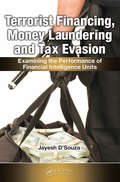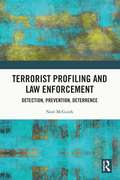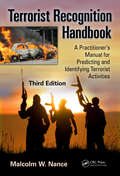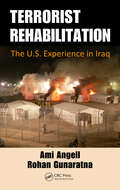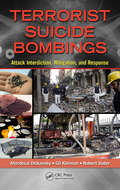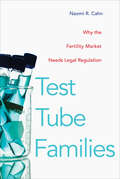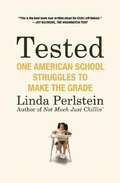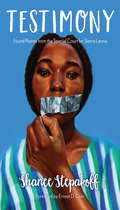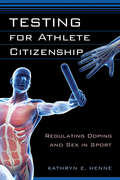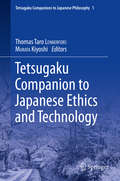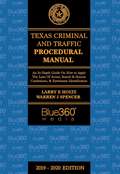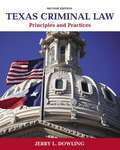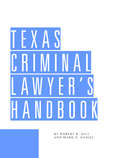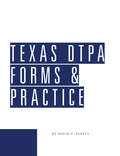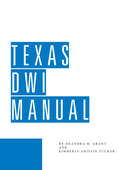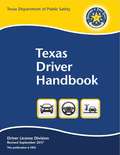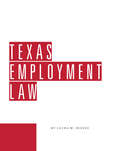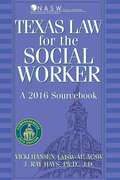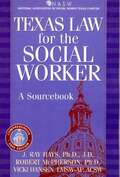- Table View
- List View
Terrorist Financing, Money Laundering, and Tax Evasion: Examining the Performance of Financial Intelligence Units
by Jayesh D'SouzaTracking funding is a critical part of the fight against terrorism and as the threat has escalated, so has the development of financial intelligence units (FIUs) designed to investigate suspicious transactions. Terrorist Financing, Money Laundering, and Tax Evasion: Examining the Performance of Financial Intelligence Units provides a thorough analy
Terrorist Profiling and Law Enforcement: Detection, Prevention, Deterrence
by Noel McGuirkThis book analyses the usefulness of terrorist profiling utilised by law enforcement officers as a pre-emptive means to assist them in the detection, prevention and deterrence of terrorism and/or its preparatory activities. It explores two main themes arising from the phenomenon of terrorist profiling: the lawfulness of terrorist profiling and the utility of profiling. These two themes are explored in three separate parts. Firstly, the book begins by drawing upon human rights concerns arising from the use of terrorist profiling by law enforcement officers. Secondly, an analytical framework capable of making determinations on the usefulness of terrorist profiling. This framework develops a profiling spectrum that ranges from formal and informal manifestations of terrorist profiling that forms the basis for evaluating its usefulness. Finally, the book presents an examination of various manifestations of terrorist profiling by separating the analysis of the ‘construction’ of profiles on the one hand, from their ‘application,’ on the other, so as to be able to identify and examine profiling’s usefulness as a technique to assist law enforcement officers make predictions about likely offender characteristics. This book ultimately concludes that terrorist profiling should only be conducted by undertaking a systematic assessment of the construction of profiles separate from the application of profiles whilst simultaneously taking into account fundamental human rights concerns with the practice of terrorist profiling. The work will be an essential resource for academics, law enforcement officers and lawyers in the disciplines of law, criminology, human rights, criminal justice and policing. As the book engages with terrorist profiling, it will also be of interest to those engaged in the psychology of terrorism.
Terrorist Recognition Handbook: A Practitioner's Manual for Predicting and Identifying Terrorist Activities, Third Edition
by Malcolm W. Nance Desmond WengerFirst published in 2003, Terrorist Recognition Handbook: A Practitioner's Manual for Predicting and Identifying Terrorist Activities remains one of the only books available to provide detailed information on terrorist methodology revealing terrorist motivation, organizational structure, planning, financing, and operational tactics to carry out atta
Terrorist Rehabilitation: The U.S. Experience in Iraq
by Rohan Gunaratna Ami AngellBecause terrorists are made, not born, it is critically important to world peace that detainees and inmates influenced by violent ideology are deradicalized and rehabilitated back into society. Exploring the challenges in this formidable endeavor, Terrorist Rehabilitation: The U.S. Experience in Iraq demonstrates through the actual experiences of m
Terrorist Suicide Bombings: Attack Interdiction, Mitigation, and Response
by Robert Slater Mordecai Dzikansky Gil KleimanUrban environments are prime targets for suicide bombings over the next decade. While the threat may be ever-present, measures are available that can empower law enforcement personnel to thwart attacks, or at least mitigate the effects by reducing casualties. Written by professionals with first-hand experience, Terrorist Suicide Bombings: Attack In
Tescopoly: How One Shop Came Out On Top And Why It Matters
by Andrew SimmsYou can shop anywhere you like -- as long as it's Tesco The inexorable rise of supermarkets is big news but have we really taken on board what this means for our daily lives, and those of our children? In this searing analysis Andrew Simms, director of the acclaimed think-and-do-tank the New Economics Foundation and the person responsible for introducing 'Clone Towns' into our vernacular, tackles a subject none of us can afford to ignore. The book shows how the supermarkets -- and Tesco in particular -- have brought: " Banality -- homogenized high streets full of clone stores " Ghost towns -- superstores have drained the life from our town centres and communities " A Supermarket State -- this new commercial nanny state that knows more about you than you think " Profits from poverty -- shelves full of global plunder, produced for a pittance " Global food domination -- as the superstores expand overseas But there's change afoot, with evidence of the tide turning and consumer campaigns gaining ground. Simms ends with suggestions for change and coporate reformation to safeguard our communities and environment -- all over the world. This book has been written and published independently from the Tescopoly Alliance and is not endorsed by them.
Tescopoly: How One Shop Came Out on Top and Why it Matters
by Andrew SimmsYou can shop anywhere you like -- as long as it's Tesco The inexorable rise of supermarkets is big news but have we really taken on board what this means for our daily lives, and those of our children? In this searing analysis Andrew Simms, director of the acclaimed think-and-do-tank the New Economics Foundation and the person responsible for introducing 'Clone Towns' into our vernacular, tackles a subject none of us can afford to ignore. The book shows how the supermarkets -- and Tesco in particular -- have brought: " Banality -- homogenized high streets full of clone stores " Ghost towns -- superstores have drained the life from our town centres and communities " A Supermarket State -- this new commercial nanny state that knows more about you than you think " Profits from poverty -- shelves full of global plunder, produced for a pittance " Global food domination -- as the superstores expand overseas But there's change afoot, with evidence of the tide turning and consumer campaigns gaining ground. Simms ends with suggestions for change and coporate reformation to safeguard our communities and environment -- all over the world. This book has been written and published independently from the Tescopoly Alliance and is not endorsed by them.
Test Tube Families: Why the Fertility Market Needs Legal Regulation
by Naomi R CahnThe birth of the first test tube baby in 1978 focused attention on the sweeping advances in assisted reproductive technology (ART), which is now a multi-billion-dollar business in the United States. Sperm and eggs are bought and sold in a market that has few barriers to its skyrocketing growth. While ART has been an invaluable gift to thousands of people, creating new families, the use of someone else’s genetic material raises complex legal and public policy issues that touch on technological anxiety, eugenics, reproductive autonomy, identity, and family structure. How should the use of gametic material be regulated? Should recipients be able to choose the “best” sperm and eggs? Should a child ever be able to discover the identity of her gamete donor? Who can claim parental rights?Naomi R. Cahn explores these issues and many more in Test Tube Families, noting that although such questions are fundamental to the new reproductive technologies, there are few definitive answers currently provided by the law, ethics, or cultural norms. As a new generation of "donor kids" comes of age, Cahn calls for better regulation of ART, exhorting legal and policy-making communities to cease applying piecemeal laws and instead create legislation that sustains the fertility industry while simultaneously protecting the interests of donors, recipients, and the children that result from successful transfers.
Tested: One American School Struggles To Make The Grade
by Linda PerlsteinThe pressure is on at schools across America. In recent years, reforms such as No Child Left Behind have created a new vision of education that emphasizes provable results, uniformity, and greater attention for floundering students. Schools are expected to behave more like businesses and are judged almost solely on the bottom line: test scores. To see if this world is producing better students, Linda Perlstein immersed herself in a suburban Maryland elementary school, once deemed a failure, that is now held up as an example of reform done right. Perlstein explores the rewards and costs of that transformation, and the resulting portrait,detailed, human, and truly thought-provoking, provides the first detailed view of how new education policies are modified by human realities.
Testimony
by Scott Turow<P>Scott Turow, #1 New York Times bestselling author and "one of the major writers in America" (NPR), returns with a page-turning legal thriller about an American prosecutor's investigation of a refugee camp's mystifying disappearance. <P>At the age of fifty, former prosecutor Bill ten Boom has walked out on everything he thought was important to him: his law career, his wife, Kindle County, even his country. Still, when he is tapped by the International Criminal Court--an organization charged with prosecuting crimes against humanity--he feels drawn to what will become the most elusive case of his career. <P>Over ten years ago, in the apocalyptic chaos following the Bosnian war, an entire Roma refugee camp vanished. Now for the first time, a witness has stepped forward: Ferko Rincic claims that armed men marched the camp's Gypsy residents to a cave in the middle of the night--and then with a hand grenade set off an avalanche, burying 400 people alive. Only Ferko survived. <P>Boom's task is to examine Ferko's claims and determinine who might have massacred the Roma. <P>His investigation takes him from the International Criminal Court's base in Holland to the cities and villages of Bosnia and secret meetings in Washington, DC, as Boom sorts through a host of suspects, ranging from Serb paramilitaries, to organized crime gangs, to the US government itself, while also maneuvering among the alliances and treacheries of those connected to the case: Layton Merriwell, a disgraced US major general desperate to salvage his reputation; Sergeant Major Atilla Doby,a vital cog in American military operations near the camp at the time of the Roma's disappearance; Laza Kajevic, the brutal former leader of the Bosnian Serbs; Esma Czarni, Ferko's alluring barrister; and of course, Ferko himself, on whose testimony the entire case rests-and who may know more than he's telling. <P>A master of the legal thriller, Scott Turow has returned with his most irresistibly confounding and satisfying novel yet. <P><b>A New York Times Bestseller</b>
Testimony: Found Poems from the Special Court for Sierra Leone (The Griot Project Book Series)
by Shanee StepakoffSierra Leone’s devastating civil war barely caught the attention of Western media, but it raged on for over a decade, bringing misery to millions of people in West Africa from 1991 to 2002. The atrocities committed in this war and the accounts of its survivors were duly recorded by international organizations, but they run the risk of being consigned to dusty historical archives. Derived from public testimonies at a UN-backed war crimes tribunal in Freetown, this remarkable poetry collection aims to breathe new life into the records of Sierra Leone’s civil war, delicately extracting heartbreaking human stories from the morass of legal jargon. By rendering selected trial transcripts in poetic form, Shanee Stepakoff finds a novel way to communicate not only the suffering of Sierra Leone’s people, but also their courage, dignity, and resilience. Her use of innovative literary techniques helps to ensure that the voices of survivors are not forgotten, but rather heard across the world. This volume also includes an introduction that explores how the genre of “found poetry” can serve as a uniquely powerful means through which writers may bear witness to atrocity. This book’s unforgettable excavation and shaping of survivor testimonies opens new possibilities for speaking about the unspeakable.
Testing for Athlete Citizenship
by Kathryn E. HenneIncidents of doping in sports are common in news headlines, despite regulatory efforts. How did doping become a crisis? What does a doping violation actually entail? Who gets punished for breaking the rules of fair play? In Testing for Athlete Citizenship, Kathryn E. Henne, a former competitive athlete and an expert in the law and science of anti-doping regulations, examines the development of rules aimed at controlling performance enhancement in international sports. As international and celebrated figures, athletes are powerful symbols, yet few spectators realize that a global regulatory network is in place in an attempt to ensure ideals of fair play. The athletes caught and punished for doping are not always the ones using performance-enhancing drugs to cheat. In the case of female athletes, violations of fair play can stem from their inherent biological traits. Combining historical and ethnographic approaches, Testing for Athlete Citizenship offers a compelling account of the origins and expansion of anti-doping regulation and gender-verification rules. Drawing on research conducted in Australasia, Europe, and North America, Henne provides a detailed account of how race, gender, class, and postcolonial formations of power shape these ideas and regulatory practices. Testing for Athlete Citizenship makes a convincing case to rethink the power of regulation in sports and how it separates athletes as a distinct class of citizens subject to a unique set of rules because of their physical attributes and abilities.
Tetsugaku Companion to Japanese Ethics and Technology (Tetsugaku Companions to Japanese Philosophy #1)
by Thomas Taro Lennerfors Kiyoshi MurataThis book explores the relevance of Japanese ethics for the field of ethics of technology. It covers the theories of Japanese ethicists such as Nishida Kitarō, Watsuji Tetsurō, Imamichi Tomonobu, Yuasa Yasuo, as well as more contemporary ethicists, and explores their relevance for the analysis of energy technologies, ICT, robots, and geoengineering. It features contributions from Japanese scholars, and international scholars who have applied Japanese ethics to problems in the global condition. Technological development is considered to cause new ethical issues, such as genetically modified organisms fostering monocultures, nanotechnologies causing issues of privacy, as well as health and environmental issues, robotics raising issues about the meaning of humanity, and the risks of nuclear power, as witnessed in the Fukushima disaster. At the same time, technology embodies a hope for mankind, such as ICT improving relationships between human beings and nature, and smart systems assisting humans in leading a more ethical and environmentally friendly life. This book explores these ethical issues and their impact from a Japanese perspective.
Texas Criminal And Traffic Procedural Manual: 2019-20 Edition
by Larry Holtz Warren SpencerAuthors Holtz and Spencer take an innovative approach to the study and practical application of modern criminal procedure. The book dissects and analyzes critical court cases involving the laws of arrest, search and seizure, investigative detentions (including stop and frisk, and motor vehicle stops), interviews, confessions and Miranda, the right to counsel, identification procedures, evidence, and law enforcement liability. The Texas Law Enforcement Handbook: Contemporary Criminal Procedure is a critical resource for law enforcement agencies and criminal justice professionals.
Texas Criminal Forms
by Bob Gill Mark DanielTexas Criminal Forms No better timesaver exists than a well drafted, on-point form. Here are over 580 in print and on CD, plus a law-and-procedure outline ... all for $119. Judge Robert K. Gill and Mark Daniel's Texas Criminal Forms covers each key procedural step with: * The relevant code sections. * Summaries of the interpretive cases. * Judicial and practitioner advice for avoiding common pitfalls. * A complete collection of practice-proven forms. These Texas-specific forms take you start-to-finish, from client retention through evidence suppression to punishment. The book also includes law-and-procedure outline with hundreds of case citations. Deal with the ever-increasing pressures to do more in less time by ordering your copy of Texas Criminal Forms today.
Texas Criminal Jury Charges
by Elizabeth Berry George GallagherTexas Criminal Jury Charges provides the most comprehensive and authoritative set of criminal jury charges available in Texas. This affordable resource offers more than 650 pre-drafted instructions, detailed legal discussions with 1,100 supporting citations, and dozens of strategies. Use it to: * Plan winning pretrial strategies * Spot and set-up issues * Identify evidence requirements * Negotiate favorable plea bargains * Win important instructional battles * Deliver better results for your clients The book's jury charges cover the full range of crimes, from manslaughter to capital murder, from assault to aggravated sexual assault, from handling waste without permits to unauthorized discharge of pollutant, and hundreds more. Before each set of charges you will find an analysis of the underlying law, complete with exceptions, caveats, and practice tips.
Texas Criminal Law: Principles And Practices
by Jerry L. DowlingFor undergraduate courses in Texas Criminal Law Criminal Law in the Lone Star State Texas Criminal Law: Principles and Practices provides an in-depth review of Texas criminal law while highlighting how Texas legal sanctions differ from other states. Its state-specific focus on terminology and laws makes this an ideal text for readers planning to serve in the Texas criminal justice system. The Second Edition uses historical references and inter-state comparisons to examine the Texas criminal law system in varied contexts. The book uses real world examples of the day-to-day application of laws by law enforcement to connect major concepts to their practical application in the field. A scholarly presentation is balanced by an informal tone, making Texas Criminal Law interesting and easily digestible for readers.
Texas Criminal Lawyer’s Handbook
by Robert Gill Mark DanielMark Daniel and Judge Robert K. Gill, two of the most respected criminal law authorities in the state, have rejuvenated and expanded Paul McClung's beloved criminal casebook. Here is ready access to key Texas criminal law precedent. Find winning arguments, evaluate key issues, anticipate the opposition's moves, and locate case support with Texas Criminal Lawyer's Handbook. This authoritative work provides practical and detailed coverage of today's tough issues: * Admissibility of DNA Evidence * Batson Challenges * Challenges for Cause * Child Abuse Evidence * Child Witnesses * Confessions * Discovery Issues * Hate Crimes * Illegal Searches * Ineffective Counsel * Prior Sexual Conduct * Probable Cause * Probation Revocation Issues * Sentencing Issues Now Texas Criminal Lawyer's Handbook contains three types of helpful information skillfully woven together in a quick-reading, easy-to-follow reference guide: 1. Authoritative legal analysis. 2. Timesaving forms and checklists. 3. Practice tips. Search and seizure Strategies for cross-examination Discovery Jury selection Trial objections The most comprehensive and respected criminal practice guide in Texas, providing everything you need to help you prepare for, and win, criminal trials. Covers more than 250 topics. The Handbook also gives you in-depth practice advice on constitutional rights, documentary evidence, scientific evidence, impeachment techniques, punishment, and more.
Texas DTPA Forms and Practice Guide
by David G. TekellRevisions to the Deceptive Trade Practices-Consumer Protection Act continue to give consumers more hurdles to overcome. The courts are strict in determining which DTPA cases fit within the "laundry list" pleading provisions. A "knowing" violation is required for all mental anguish damages. And in some cases, damage caps may eliminate DTPA protection altogether. Overcome DTPA defenses and win tough Insurance Code cases with Tekell's Texas DTPA Forms and Practice Guide. This useful guide includes over 290 forms, from custom Insurance Code interrogatories and pattern deposition questions through jury charges to laundry list questions and trial objection checklists. You will also find detailed legal discussions and step-by-step procedures in every major consumer law category, including: * Purchase of goods and services * Investments and business opportunities * Home and land purchases * Assisted living facilities * Commercial property leases * Construction defects * Lender liability
Texas DWI Manual
by Deandra M. GrantIncludes hundreds of trial-tested questions and accompanying explanations that can be used to create compelling cross-examinations of the State's witnesses.
Texas Driver Handbook
by Texas Department of Public Safety Driver License DivisionWith a view to to help you qualify for a Texas driver license, and become a safer driver, this handbook provides you with accurate information on traffic laws, clear images of road signs, examples of common driving situations, and general safety tips.
Texas Employment Law
by John Hagan Justin Smith James Tanner Rogge Dunn Kristi Taylor Jane Matheson Rani Garcia John Browning Steven Clark Wade Forsman Joel Gomez Steven Ladik Laura Franze Bryan NealTexas-Specific Answers to Employment Law Questions The first and best place to look for employment advice is Laura Franze's Texas Employment Law. It provides well-supported answers to both common and difficult questions, annotating its suggestions with 3,800 cases and 156 forms. The book includes over 60 substantive discovery and pleading forms, omission-preventing checklists and outlines, time-saving letters, authoritative jury instructions, dispute-avoiding employment agreements, and artfully-drafted motions. There are nine well-supported chapters covering all types of employment discrimination - disability, sexual harassment, FMLA, race, sex, and age. It also includes substantive and procedural analysis of the Texas Commission on Human Rights Act and its remedies, over 150 pages on workplace torts, with comprehensive coverage of interference with business interests, violations of business covenants, trade secret and privacy issues, defamation, negligence, intentional infliction of emotional distress, fraud and more. Authoritative coverage of the traditional issues of wages, hours, and overtime, along with safety and health, employee benefits, unemployment compensation, employer record-keeping and internal policies. Additionally, Texas Employment Law includes the law of employment agreements - written, oral, and implied. Constructive discharge and the Sabine Pilot doctrine. Proper and improper methods of employee selection. Employment-oriented immigration laws and much more. The first and best place to look for employment answers is Laura Franze's Texas Employment Law Authoritative guidance is provided in this detailed analysis of local and federal cases and statutes covering: Employment contracts, Wages, hours & overtime, Employee safety & health, Immigration issues, Pension, Health & welfare benefits, Privacy issues, FMLA Wrongful discharge, Constructive discharge, Sexual harassment, Disability discrimination, Race, sex, and age discrimination, Arbitration of employment claims, and a thorough discussion of whistleblower protection under Sarbanes-Oxley, as well as practical advice on the impact of the law for employers and employees.
Texas Estate Planning
by Dianne ReisSpeed is important when you charge fixed fees for creating wills and trusts, but imprecise drafting can lead to costly errors. When novel situations demand quick answers and custom clauses, turn to Dianne Reis' Texas Estate Planning. Her big book contains over 40 Texas-specific pattern wills and trusts annotated with alternate clauses, pitfalls to avoid, practice tips, recent cases, tax considerations, and more. For example, you receive: * Pattern clauses. Drafting recommendations include sample clauses that you can copy and paste. * Direct answers. Issue-oriented text is to-the-point, delivered without hedging, and is well-supported with recent cases. * Flow charts. Use the handouts to help your clients understand how particular types of assets affect the estate plan. * Tax considerations. Consequences and opportunities are clearly presented and supported with examples. Every estate planning attorney needs a base of ready answers, clauses, and documents. This affordable guide will add many reliable answers and over 80 forms to your collection.
Texas Law For The Social Worker: A 2016 Sourcebook
by Vicki Hansen J. Ray HaysTEXAS LAW FOR THE SOCIAL WORKER: A 2016 SOURCEBOOK provides licensed social workers, social work students, and professors with the key legal and policy issues specific to the state of Texas today. Issues directly affecting practitioners and their students have been carefully selected from statutes, case laws, official archives of the Attorney General Opinions and Open Records Opinions, the Social Work Practice Act, and the NASW Code of Ethics. No other compilation of such critical, up-to-date material exists for the state of Texas. New up-to-date material from 83rd Legislative Session!
Texas Law for the Social Worker: A Sourcebook
by Robert McPherson Jay Ray HaysTexas Law for the Social Worker provides licensed social workers, social work students, and professors with the key legal and policy issues specific to the state of Texas today. <p><p>Issues directly affecting practitioners and their students have been carefully selected from statutes, case laws, official archives of the Attorney General Opinions and Open Records Opinions. <p><p>No other compilation of such critical, up-to-date material exists for the state of Texas. Produced in collaboration with the Texas Psychological Association.
